In recent years, AI has emerged as a powerful tool in revolutionising the field of mental healthcare, reshaping the way mental health conditions are understood, diagnosed, and treated. The utilisation of AI in digital mental healthcare involves machine learning algorithms that analyse large datasets, enabling accurate diagnosis, predictive analytics, personalised treatment recommendations, and the delivery of virtual therapy and support through chatbots and virtual assistants. These advancements provide accessible and personalised support to individuals, significantly improving the efficiency and reach of mental health services. This blog post has the aim to provide concrete applications of how AI can be implemented within mental healthcare solutions, accompanied with practical examples of existing implementations.
Analysing Patient Data for Improved Assessment and Treatment Plans
AI technologies have made significant progress in analysing various types of patient data. These include electronic health records, blood tests, brain images, voice recordings, behavioural signs, and even information from social media. By utilising techniques like supervised machine learning, deep learning, and natural language processing, AI algorithms can identify mental and physical states linked to specific mental health disorders. This allows for more precise risk assessments and improved treatment plans.
Remarkably, research has shown that AI algorithms can effectively identify various mental illnesses, achieving accuracy rates ranging from 63% to 92% (Graham et al. 2019). However, it’s important to note that AI doesn’t function independently but rather complements the existing methods of diagnosis and treatment in the field. The accuracy of AI diagnosis depends on factors such as the specific AI technique used and the quality of the training data, highlighting the significance of combining AI with current practices for optimal outcomes.
Ginger.io (merged with Headspace in 2021) is a nice example of a mobile platform that leverages smartphone data and AI technology to provide customised care for individuals dealing with mental illness. The app tracks various data points, such as messaging frequency, call duration, sleep patterns, and exercise frequency, to gain insights into a person’s mental health. By establishing a baseline of each user’s mobile activity, the algorithm can identify deviations that may signal a potential mental health issue. For example, a sudden burst of text messaging or phone calls may indicate a manic episode for individuals with bipolar disorder. When these deviations are detected, the app sends messages to the patient and notifies the therapists and coaches, allowing for immediate intervention and support.

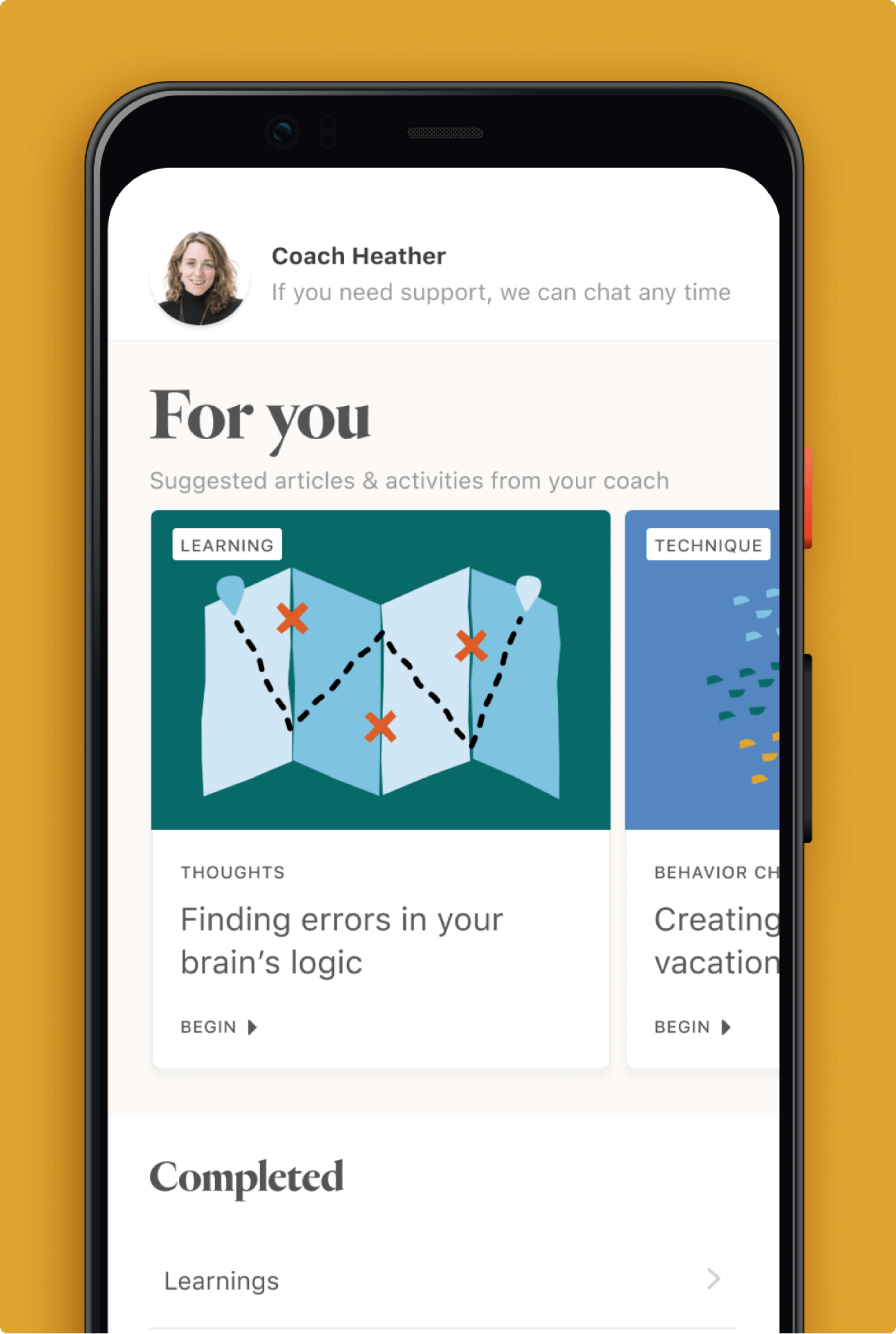
Conducting Self-Assessment and Therapy Sessions
This category predominantly comprises keyword-triggered and NLP chatbots. AI-powered chatbots have gained prominence as virtual therapists that provide guidance, track user responses, evaluate illness progression and severity, and help individuals cope with symptoms.
An example of an AI/NLP-supported chatbot is the Woebot app. When users open the app, they are greeted by a friendly and approachable chatbot character.
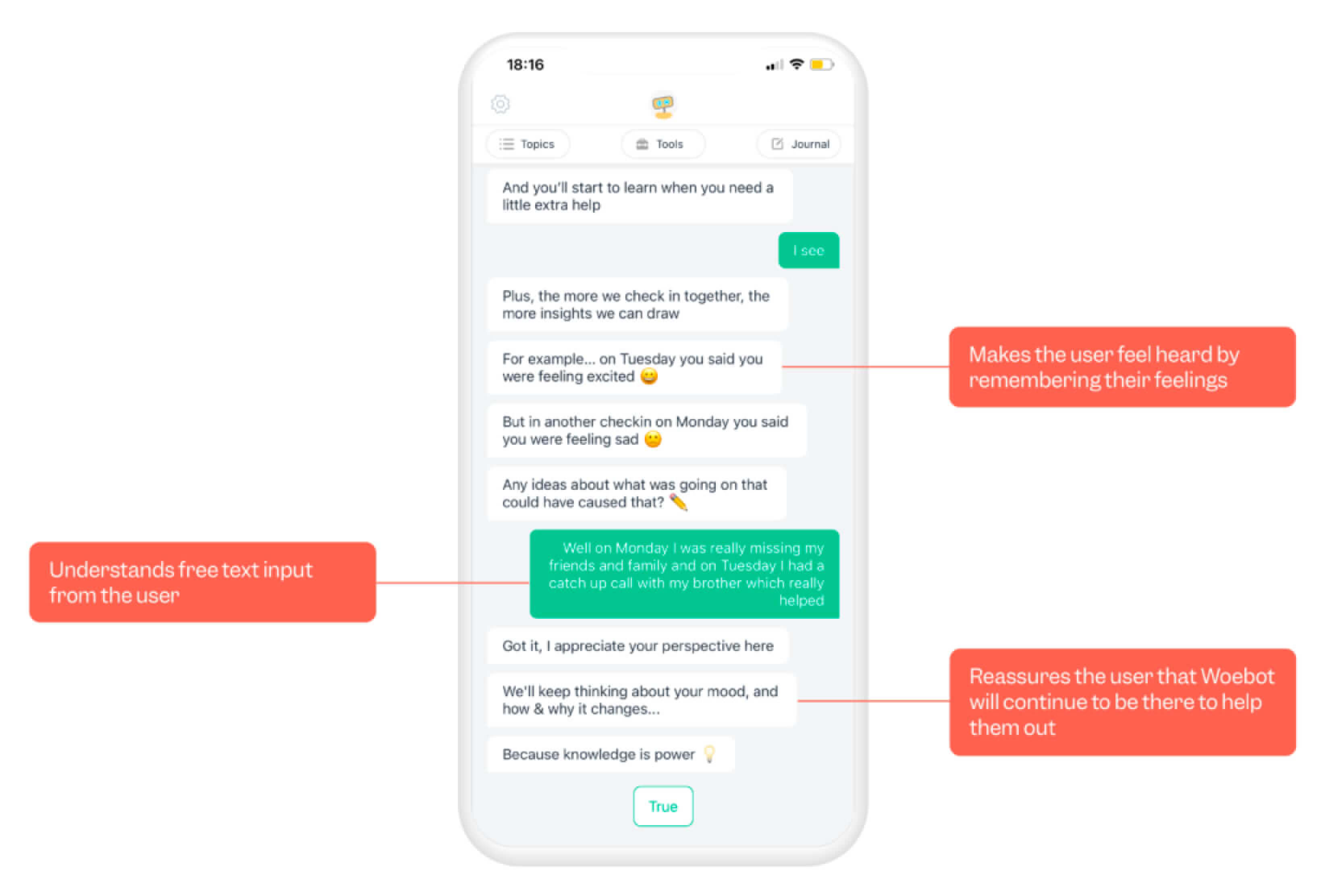
The chatbot engages the user in conversational exchanges, asking about their day, emotions, and any challenges they might be facing. Users can share their feelings, thoughts, and concerns in a safe and non-judgmental environment.
As the user communicates with Woebot, the chatbot employs evidence-based techniques from cognitive-behavioral therapy (CBT) to provide personalised guidance and support. For example, if a user expresses feelings of anxiety, Woebot might offer relaxation exercises or help the user identify and challenge negative thought patterns. It may also suggest goal-setting techniques or mood tracking exercises to monitor emotional well-being.
Throughout the interaction, Woebot uses a combination of AI-driven responses and pre-programmed content to tailor the experience to the user’s specific needs. The app’s interface is intuitive and user-friendly, making it easy for individuals to navigate and participate in the conversations.
An other example of how AI can be used to conduct self-assessments, is IntelliProve. We’ve developed a revolutionary facial analysis algorithm designed to assess an individual’s mental wellbeing state. From a short video of a person’s face, our technology can derive biomedical signals, obtained from small color changes underneath the skin. Physiological and mental biomarkers (such as heart rate variability and ANS balance) are calculated by analysing these biomedical signals by our AI model. Based on these biomarkers, a person’s wellbeing state can be constructed. To learn more about how biomarkers work, you can read our blog post about the use of biomarkers in mental health assessment.
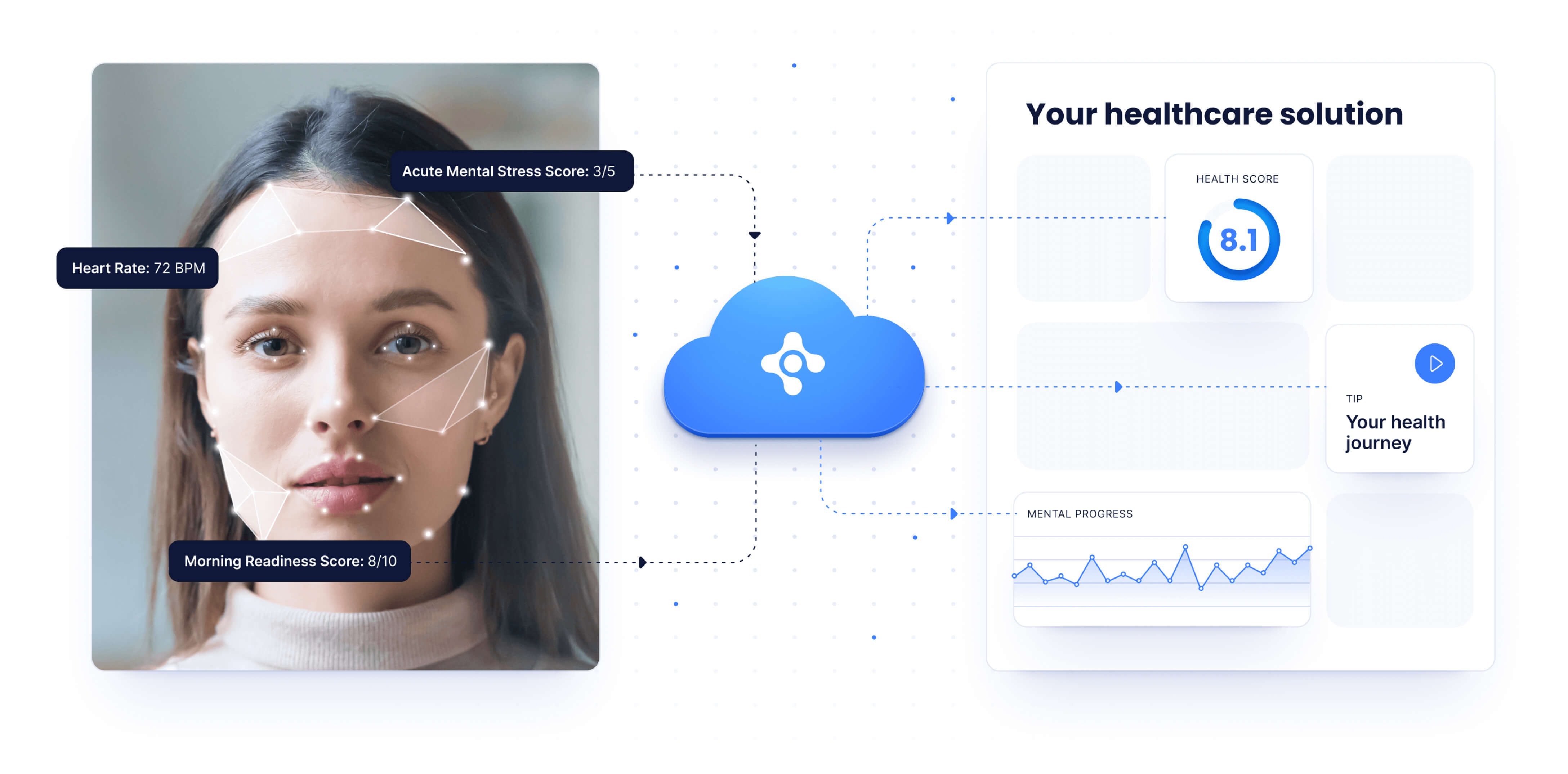
By integrating our measurement software into digital mental healthcare platforms, we empower mental health solutions to gain valuable insights and offer personalised content recommendations to their users. These recommendations are aimed to enhance users’ stress levels and overall mental wellbeing. A concrete case of how we’ve implemented our software into one of our customer’s platform can be read in our customer story with Mindlab, one of the leading corporate e-health platforms in Europe.
Enhancing Patient Engagement
AI technologies are integrated into mobile apps and reminder systems to facilitate communication, track medication adherence, and empower patients with essential knowledge. Furthermore, AI plays a vital role in improving and personalising patient experience by supporting patient engagement strategies. AI chatbots can be employed to simplify access to care, process phone calls, make appointments, offer directions, and provide health education.
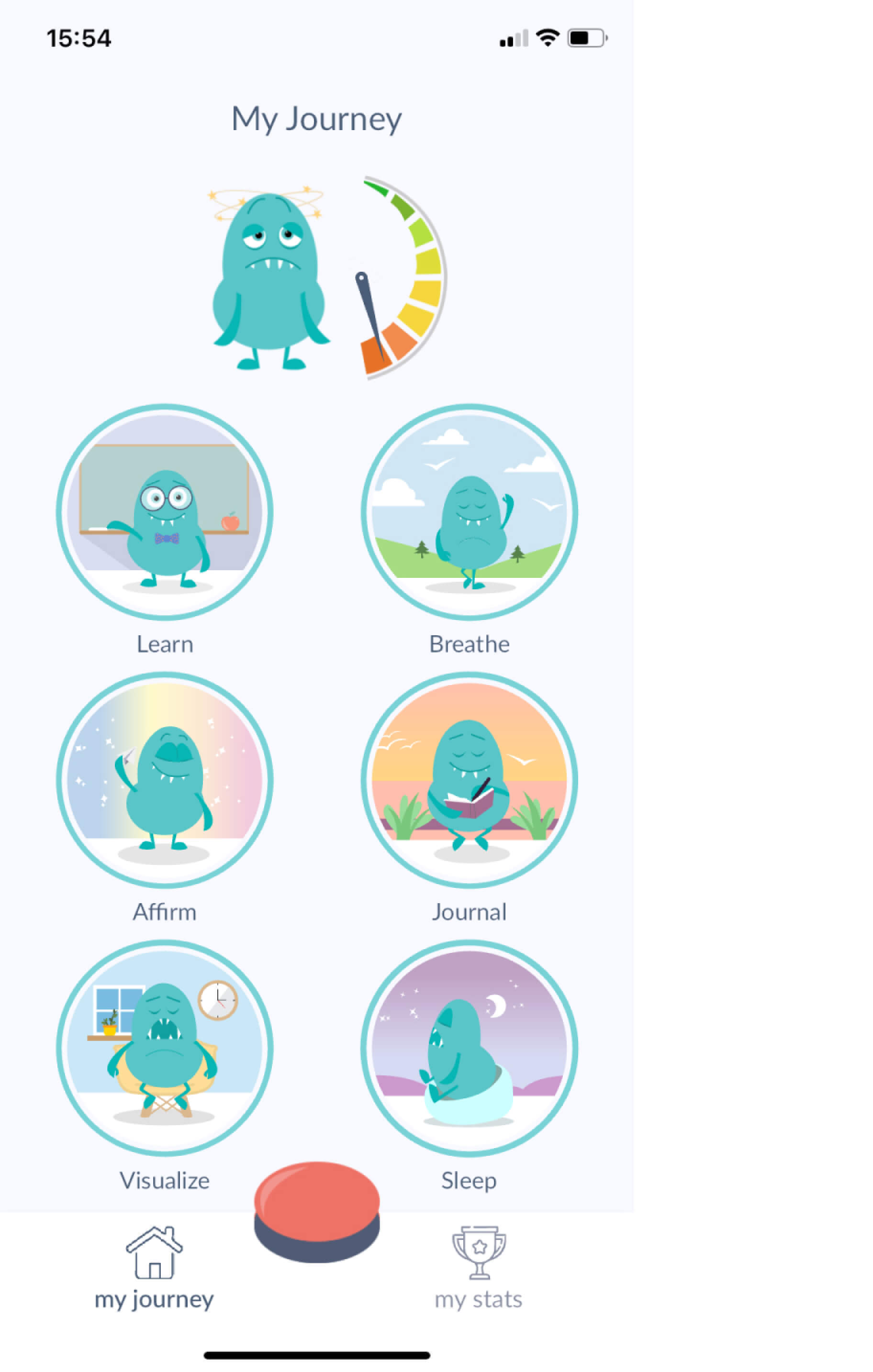
Rootd is a highly intuitive mobile app designed to provide immediate support and tools for individuals dealing with anxiety and panic attacks. The user interface is visually appealing and easy to navigate, offering a virtual toolkit for managing distressing moments. When a user encounters anxiety or a panic attack, they can open the Rootd app and access a range of resources. These include step-by-step breathing exercises, grounding techniques, and informative content on anxiety management.
AI plays a crucial role in enhancing the effectiveness of Rootd and achieving its goals. The app utilises AI algorithms to provide personalised support and recommendations based on each user’s specific needs and experiences. By analysing user interactions and feedback, the AI adapts and tailors the content and techniques to suit individual preferences, making the app more relevant and engaging for each user. Furthermore, the AI-driven chatbot within Rootd offers real-time assistance and conversation, simulating a supportive and understanding environment that helps users feel heard and less alone in their struggles.
The AI technology also continuously learns from user data to improve the app’s offerings, ensuring that Rootd remains up-to-date and effective in assisting users with anxiety management. Through these AI-powered features, Rootd can deliver personalised, timely, and valuable support to users, contributing significantly to their overall mental well-being and emotional resilience.
Augmenting Therapists with Automation Technology
Mental health professionals can benefit from AI-driven platforms that automate daily workflows and streamline administrative tasks. Preliminary research suggests that implementing such systems can significantly improve access to quality mental healthcare by up to 400%. Moreover, AI can enhance efficiency in tasks like form filling, retrieving clinical information from electronic health records, and processing clinical papers.
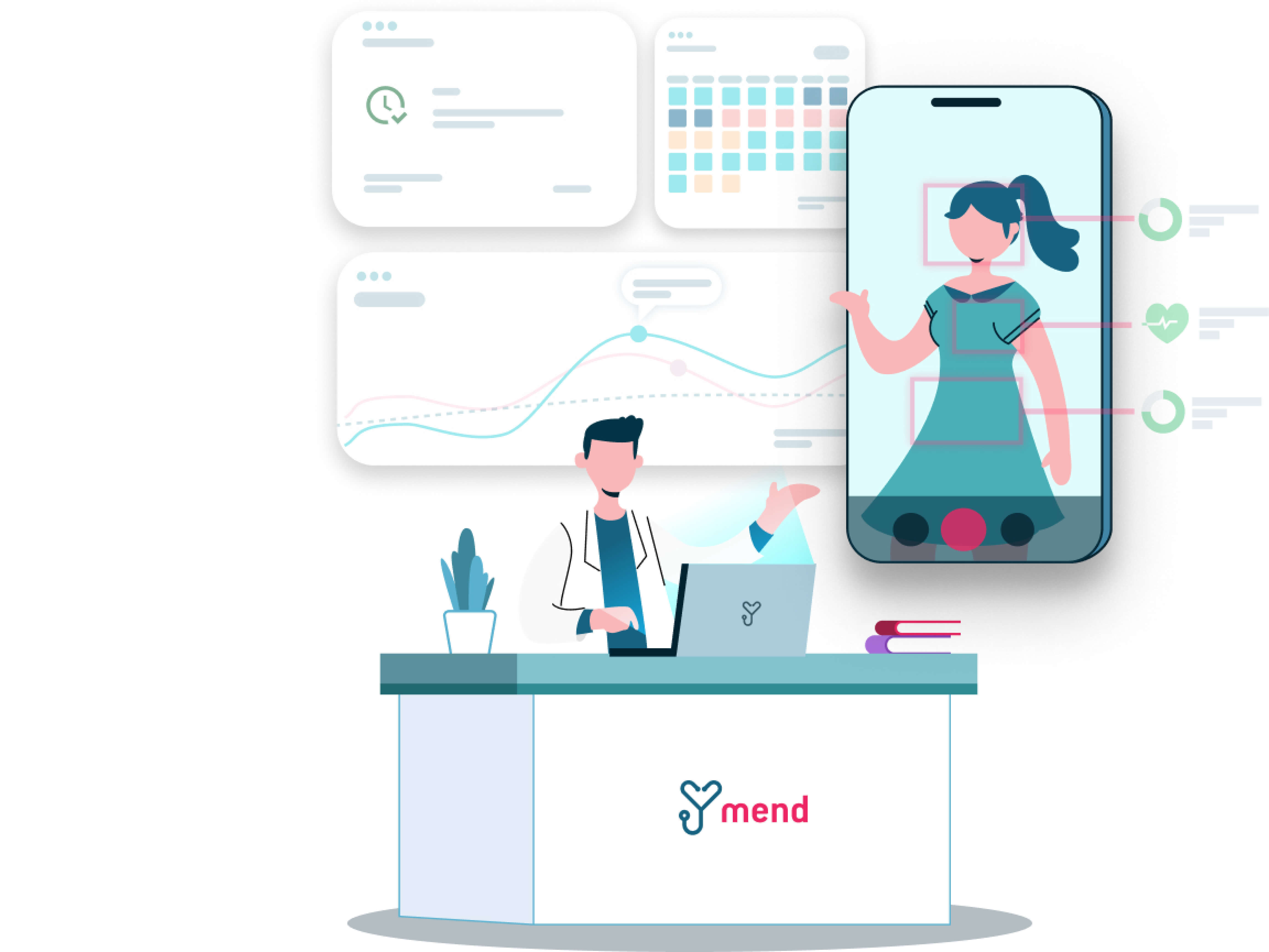
Let’s illustrate this concept with an example. Mend is an innovative telehealth platform that integrates AI-driven features to enhance mental healthcare services. Users can easily schedule appointments with their preferred mental healthcare providers through a user-friendly interface. Mend’s automated appointment reminders help reduce missed sessions and improve patient engagement.
Before appointments, Mend’s AI system prompts users to complete patient assessments, enabling personalised and effective treatment during sessions by providing insights into the user’s mental health status.
Between appointments, Mend’s AI-powered in-app messaging serves as a valuable resource, offering users coping techniques, self-help resources, and mental health education, fostering a sense of connection and support throughout their mental health journey. Additionally, it streamlines billing and payment processes securely within the system.
Conclusion
AI is reshaping the landscape of mental healthcare by leveraging its capabilities in data analysis, self-assessment and therapy, patient engagement, and workflow automation. With increasing accuracy in assessing risks, personalising treatment plans, and improving patient experiences, AI is becoming a crucial ally in the quest for accessible, effective, and compassionate mental healthcare.
